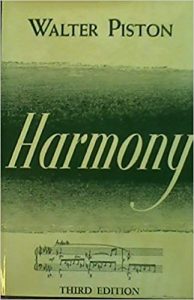
There was a time not long ago when you could not turn over a musical rock without finding a copy of Walter Piston’s book Harmony underneath. First published in 1941, Piston’s Harmony was ubiquitous; my first copy was a yellow-jacketed third edition, published in 1969. (It is now in its fifth edition; the fourth and fifth editions have been “revised and expanded” by Mark Devoto, a music professor emeritus of Tufts University). When I was in high school, I did my level best to teach myself harmony out of that third edition of Piston’s Harmony. At the time, I thought I had sort of succeeded, though looking back I realize that I failed miserably. In kindness to myself, though, my failure was not entirely my fault; it was just as much the fault of the nonsensical (if traditional) assumption that the study “harmony” (the simultaneous sounding of different pitches) was somehow separable from melody, counterpoint, phrase structure, and form, which as I’ve come to realize in my maturity it is most certainly NOT.
The composer and music theorist Walter Piston (1894-1976) was a professor of music at Harvard University from 1926 until his retirement in 1960. Despite some dabbling with 12-tone technique, his best and most popular music is neo-tonal and is categorized under the rather too-wide blanket of “mid-century American musical populism.”

Because he was a compositional populist; because he had made so much money from his books on harmony, counterpoint, analysis, and orchestration; and, worse, because he was a professor at Harvard, my modernist professors at Princeton were typically rather unkind towards him on those rare moments when they bothered to acknowledge his existence at all.
For such modernist composers, Walter Piston – whose self-expressive tonal music employed Classical era musical forms and radiated a subtle but noticeable whiff of “Americana” – was a dinosaur, and evolutionary dead end, an irrelevance unconscious of the new global reality.
Well, live and learn. The horrific wounds inflicted by the war have, for the most part, healed and the dogmatic emotionalism of the post-war era has settled down. As a result, we can acknowledge and savor the music of such mid-century populists as Walter Piston without getting all caught up in the aesthetic politics that seemed so important in the 1940s, 1950s, and 1960s. …
See
